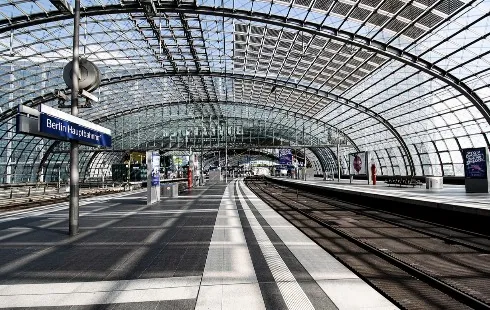
Poker Slang That Will Have You Talking Like a Pro
Section: Arts
Germany's Minister for Economic Affairs and Climate Action, Robert Habeck, is anticipated to be in office for only a few more weeks. He recently presented new CO2 emission data, using it as a platform for a significant evaluation of his tenure, which he described as an 'assessment report.' This reflection comes amid concerns about the legacy of his climate policies and the potential directions of future governmental action.
In his analysis, Habeck expressed disappointment over his electoral performance as the Green Party's candidate for Chancellor, while emphasizing the progress made during his term as Climate Action Minister. He articulated his apprehension regarding whether the incoming government, likely to be a coalition of the Union and SPD, will continue on the path he has set for Germany's climate goals.
Habeck asserted that Germany is on track to meet its climate objectives, citing the last three years as pivotal in the nation's climate policy evolution. He highlighted significant advancements in renewable energy deployment and improvements in electricity network infrastructure. One notable achievement he mentioned was the positive shift in the building sector, attributed to a controversial heating law that mandates a gradual transition to more environmentally friendly heating systems.
According to the Federal Environment Agency, Germany's greenhouse gas emissions fell by 3.4% in 2024 compared to 2023, amounting to 649 million tons of CO2 equivalents. These figures indicate that the country is significantly below the legally permitted emissions cap of 693.4 million tons for the year. Projections suggest that the goal of reducing emissions by 65% by 2030 compared to 1990 levels is now within reach.
Habeck noted that the energy sector has made a disproportionate contribution to emissions reductions, while the industrial sector remained stable due to a sluggish economic climate. He expressed confidence that even with anticipated economic growth, Germany could still achieve its climate targets by 2030.
However, the transportation sector remains a significant concern. Current emissions levels in this area still fall short of established targets, and there is an urgent need to accelerate the market adoption of electric vehicles. Dirk Messner, president of the Environmental Agency, emphasized the necessity for government support through leasing models for efficient electric cars similar to those implemented in France. He also underscored the importance of adhering to the EU's agreement to phase out the sale of new fossil fuel vehicles by 2035, a position that the Union party aims to alter.
Habeck criticized the transportation sector's failure to meet expectations, attributing this shortfall in part to political resistance, particularly from his former coalition partner, the FDP, which has opposed measures like a nationwide speed limit. He also reflected on the decision to eliminate state subsidies for electric vehicles in late 2023, labeling it a mistake made in response to budget constraints, which he argued were relatively minor compared to the vast sums now allocated for the planned 500 billion euro infrastructure fund.
Germany aims to achieve climate neutrality by 2045, meaning it will not emit more greenhouse gases than it can absorb. The path to this goal remains challenging, as current measures project an emissions reduction of about 80% by 2040, while the legal requirement stipulates at least an 88% reduction from 1990 levels.
In his address, Habeck urged the prospective new government formed by the Union and SPD to maintain the current policy direction. He pointed out that historically, these parties have not demonstrated a commitment to bold climate actions. He recalled inheriting a climate protection gap of 1.2 billion tons of CO2 in 2030 upon taking office, but with updated projections, he noted a buffer of 80 million tons could now be achieved.
At the start of 2022, Habeck had presented an initial assessment of the climate situation, indicating how far Germany was from its targets. His message then was clear: the country needed to make three times the effort in all areas of climate action. Now, he presented updated figures showing a significantly reduced gap to the established climate goals.
Environmental organizations have echoed the need for intensified efforts, warning that the positive results from the past year should not lead to complacency. Greenpeace's transport expert highlighted that improvements in renewable energy cannot continuously compensate for stagnation in the transport and building sectors. The German Environmental Aid called for measures such as a speed limit and a comprehensive energy refurbishment initiative to be prioritized by the new coalition, threatening legal action if necessary.

Section: Arts

Section: Arts

Section: Health

Section: Health

Section: News

Section: Arts

Section: News

Section: Travel

Section: News

Section: News

Health Insurance in Germany is compulsory and sometimes complicated, not to mention expensive. As an expat, you are required to navigate this landscape within weeks of arriving, so check our FAQ on PKV. For our guide on resources and access to agents who can give you a competitive quote, try our PKV Cost comparison tool.

Germany is famous for its medical expertise and extensive number of hospitals and clinics. See this comprehensive directory of hospitals and clinics across the country, complete with links to their websites, addresses, contact info, and specializations/services.

Join us for an enchanting evening of classical music featuring the renowned cellist Alban Gerhardt, who has performed with prestigious orchestras worldwide since his debut with the Berlin Philharmonic in 1991. This concert showcases an exciting collaboration with talented rising stars, including the...
No comments yet. Be the first to comment!